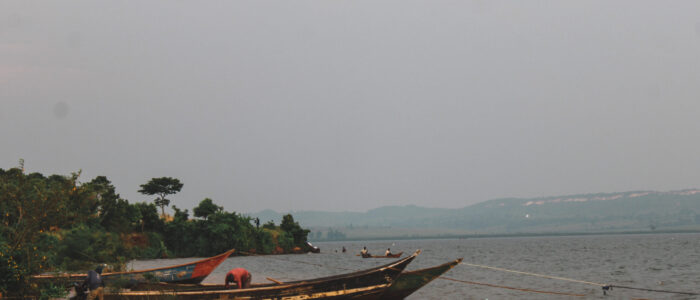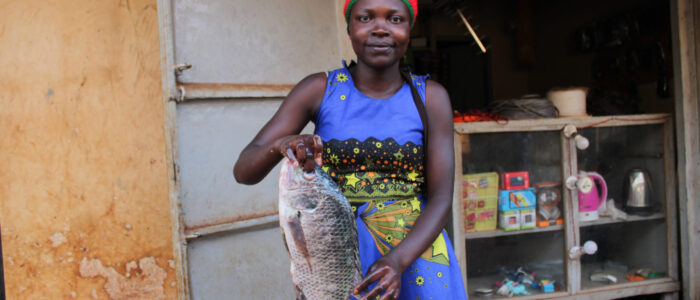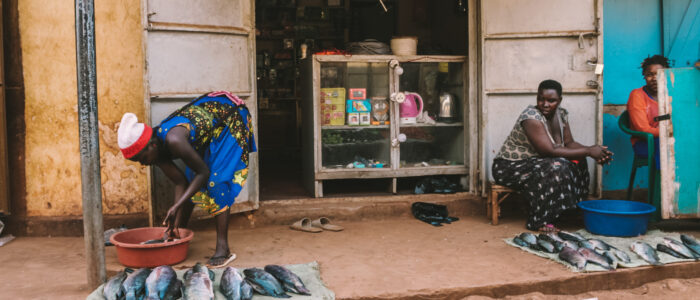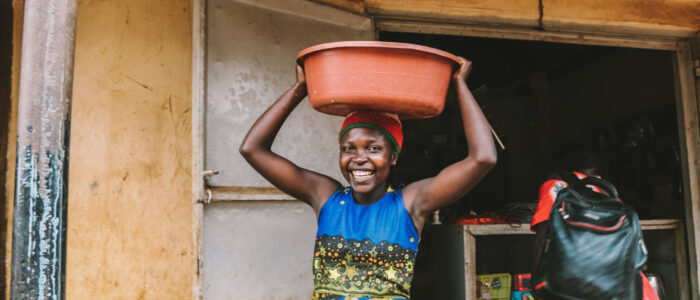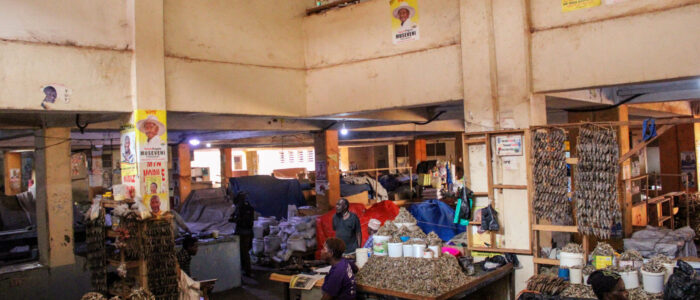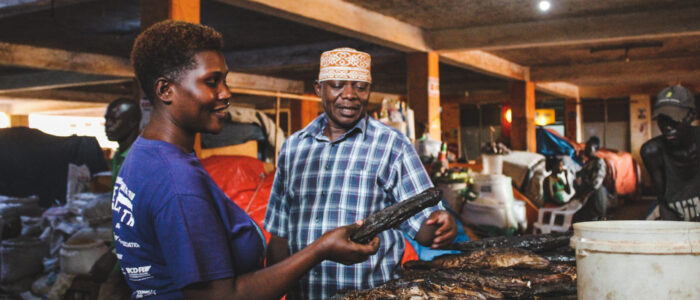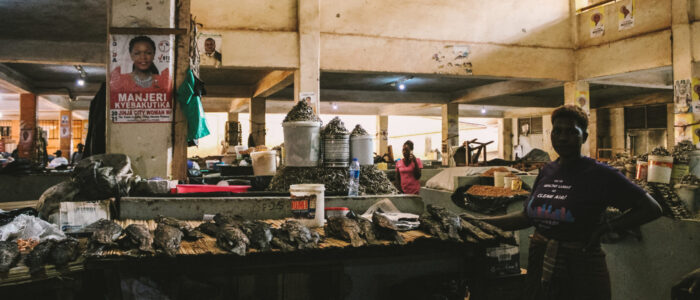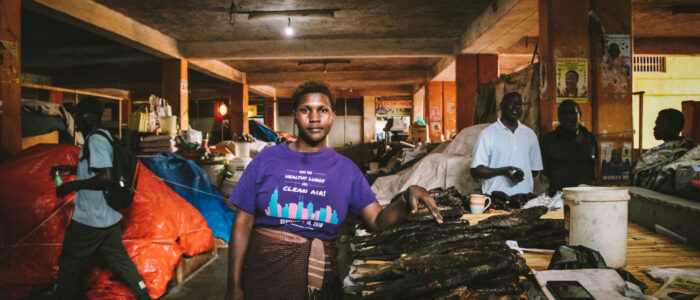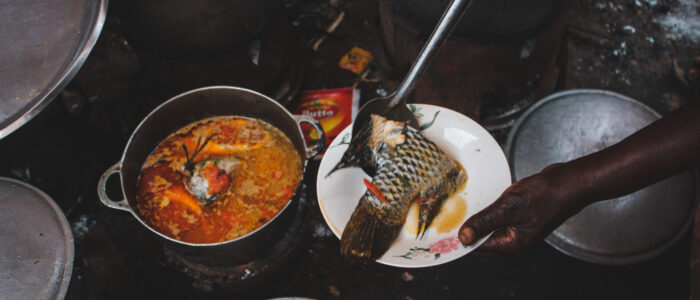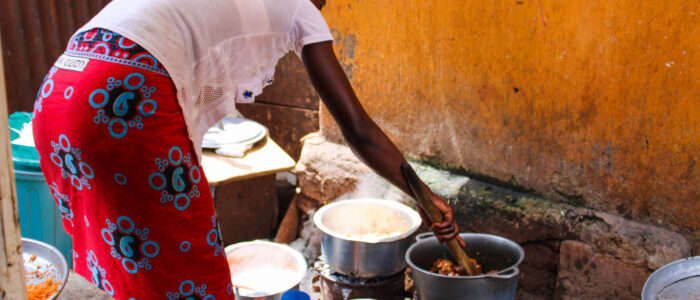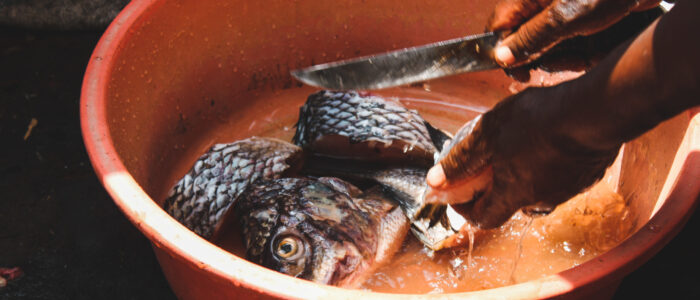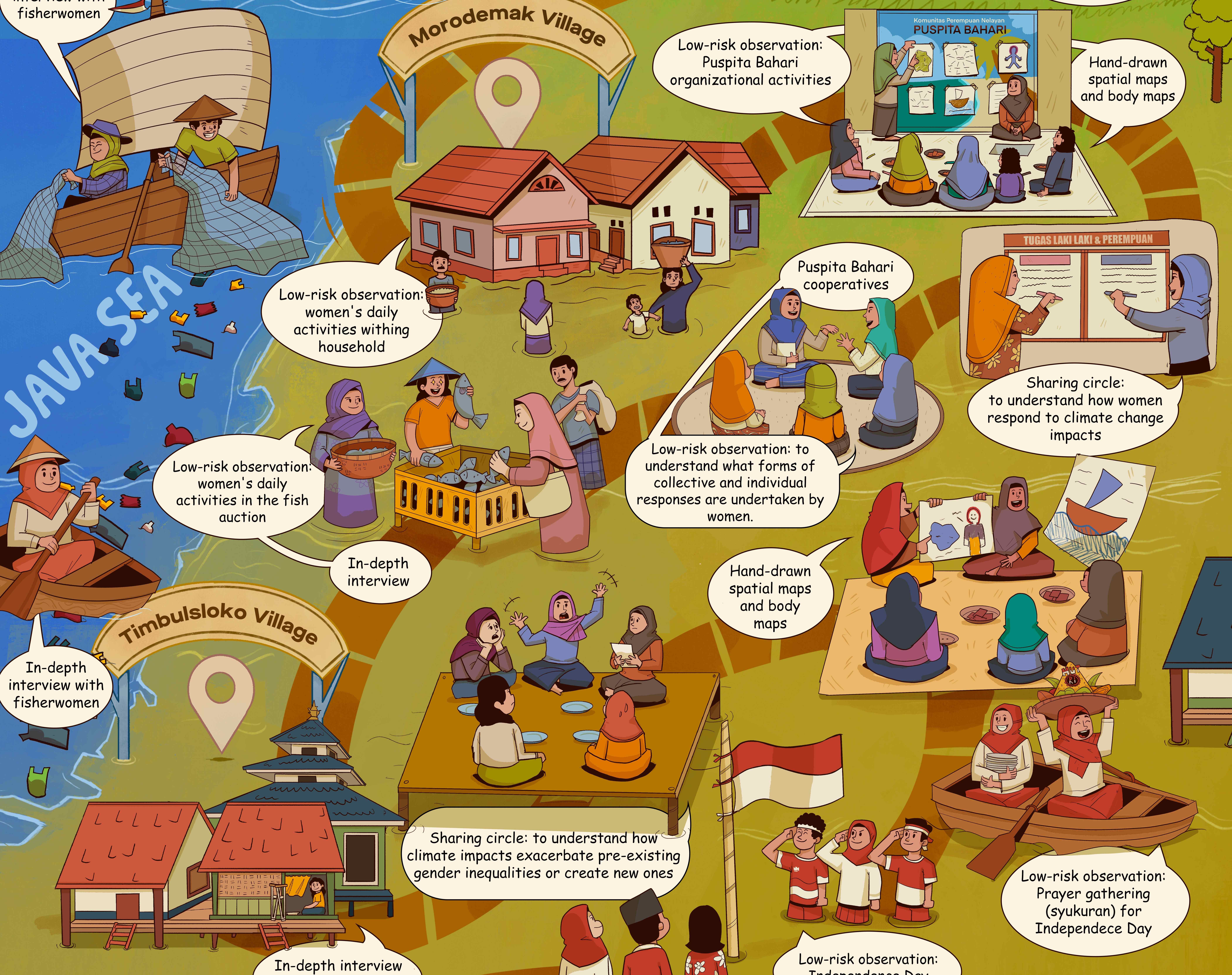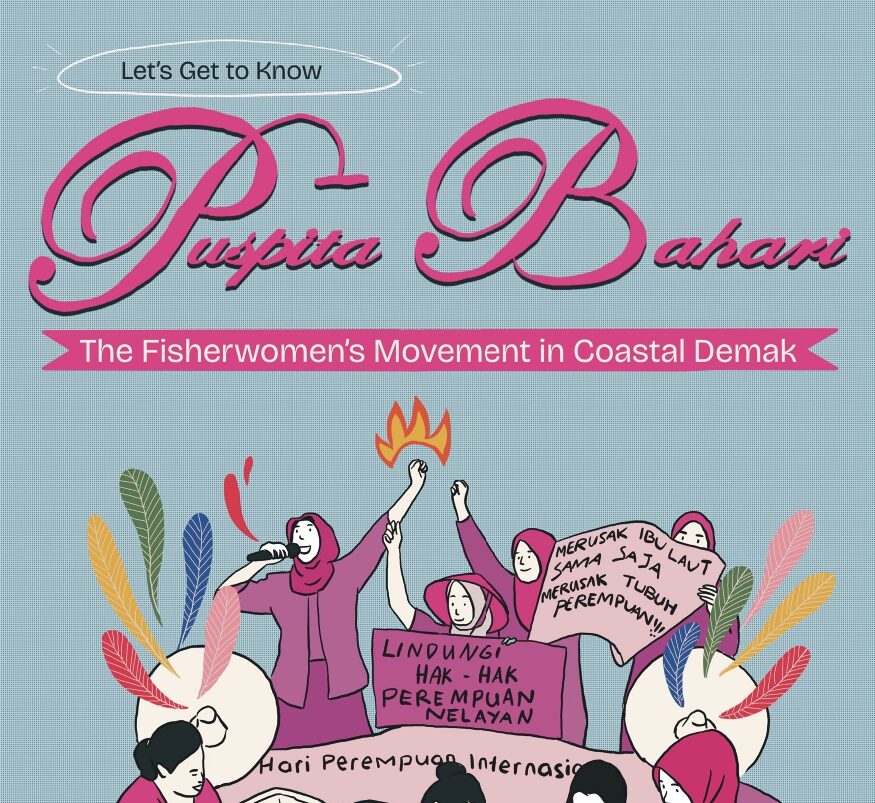Photographer Aida Namukose captures the intergenerational stories of three women who rely on Lake Victoria in Jinja, Uganda for their livelihoods.
Nalubale
Nalubale Village is a small informal fishing village on the shores of Lake Victoria, less than 10km from central Jinja in Eastern Uganda. The humble settlement has little more than 30 homes, two shops, and a mobile money stand. As with other lakeside fishing villages in Uganda, it was formed slowly as families moved from rural areas closer to the outskirts of Jinja in order to make a better living. The homes are mostly semi-permanent, made from mud and sticks. Children run around barefooted, playing by the lake or fetching water.
Lake Victoria is the largest lake in Africa, and it has an estimated 30 million people living on its shores, trying to make a living. But the ability to do so dwindles as time goes by and climate change continues to be a growing problem in Uganda’s urban areas.
Fishing is typically done either early in the morning or after the sun has gone down, as this is when the fish feed and swim closer to the surface. The most common fish that come out of
the lake are the Nile Perch and Tilapia. The population of both are fast declining, however. Competition from Chinese fishing companies as well as changes in the weather and landscape have caused the Ugandan government to impose strict regulations on where, how and by whom fishing can take place.
Most of the fishermen in Nalubale do not have licenses, so they operate under the radar and are subject to random crackdowns carried out by the military. In addition, they have to go long distances and work long hours to obtain a good catch as the consequences of overfishing, increasing water hyacinth, and dropping water levels (due to decreased rainfall) have made the job harder. One of the fishermen said: “We don’t own the Lake anymore, the Government sold it to the Chinese. What’s left for us is almost nothing, and some days you go out and get very little catch”. All this reflects in the cost of the fish, a burden which is passed on to the women that make their living from selling them in the market.
In early January 20202, I spent an evening with Grace, a 23-year-old fishmonger from the village of Nalubale. She has been in this trade for three years, buying fish from the fishermen and taking these to the nearest market to sell. The market is located in Bugembe is a town council located approximately 7 km from the centre of Jinja City. It is a bustling town with its own market and economy as well being the residence for workers in nearby Jinja. “Selling fish is what everyone around me (in Nalubale) does, it was the easiest job I could think of in order to be able to feed my child,” Grace says of her profession.
Grace buys the fish from the fishermen very early in the morning, when they have a fresh catch. She buys consistently from a few fishermen who know her, but the price has been increasing steadily over the past three years as fish disappear and the military becomes stricter.
When I asked Grace about climate change, what she knows about it and its role in the scarcity of fish, she talked about her own observations and experience on the matter: “The environment is definitely changing, I have seen it in my short life already and the few years I’ve spent living and working by the lake. The sun is getting hotter, January sun wasn’t hot and relentless like this. The rainy season is getting shorter, and it’s like the lake is drying up. Things are definitely not how they used to be before”.
Asked how this changing landscape affects her career, choices for work, and a place to live, Grace says: “Yes, eventually I will have to find something else to do in order to make enough money. The competition for fish is too high and now companies are taking over the market. There’s no space for people like us and customers don’t understand when we tell them why prices are rising”. She continues: “I’m lucky I live near town, and now Jinja has become a city. Maybe I can find work there”.
Lake Victoria continues to be an invaluable resource, source of livelihood and transport for many people in East Africa. The changing landscape and availability of natural resources may push even more people to migrate towards urban areas for employment, which brings about its own challenges. Women like Grace and their families are some of the many victims of the impact of climate change on the lake. It is an issue that affects urban dwellers more than we often think about.
The Fish Market
Jinja Central Market is one of the biggest buildings in the city. It was completed in 2018 as part of a government initiative to create permanent structures to replace the outdoor informal structures which were serving as markets. In it you can find a variety of items from fruit and vegetables to clothes and kitchen ware. Synonymous with Uganda’s broader population, most of those working in the market are young adults who are part of the informal work-force.
I spent an afternoon with Nakirya Damali, a 24-year-old resident of Jinja who sells dried fish in the market for a living. She was born two hours away from Jinja in Bugiri district and has been working in the fish trade for three years now, finding sufficient income to support herself from this business. She buys her fish from a nearby lakeside trading centre, then smokes and dries them at home for preservation before selling at the market. Fisheries from Lake Victoria currently provide employment for an estimated 3 million people, many of whom are youth like Nakirya.
“Most of my customers are people that work in the restaurant business and sometimes just people buying for their home. I like selling to restaurant owners because they understand the price and don’t bargain too much. It is good work, although sometimes business moves slow and I make a big loss,” Nakirya says.
Asked about climate change, her understanding of it and how it affects her life and work she says: “Yes, we hear about the environment changing because of pollution from industries and the way people throw trash everywhere. I think sometimes it is not easy to see the changes with your own eyes but my work allows me to deal with it directly because the fish I sell comes from the lake, which is a big part of the environment here in Jinja”.
The major challenges currently facing Uganda’s lake fishery are environmental degradation, the introduction of exotic species, overfishing and government bans. Deteriorating water quality due to pollution and water hyacinth has also caused the displacement and decline of some fish species, including the Nile Perch.
Nakirya deals solely with Nile Perch, as she is able to get in the standard adult size and it preserves much longer than other types of fish. The changing environment however has made it such that availability is now an issue, along with the other factors that affect her work.
Asked about the challenges she faces in her work as a woman and whether any of them have been exacerbated by the changing environment she says: “Yes, it is never easy working in any field as a young woman. As you can see most of the people selling fish in this market are men, and the fishermen we deal with are mostly men. We get harassed and looked down upon just because we are women, even though we are all working in the same business and trying to make money. The lack of fish in the lake and the prices have made these things even harder, as it now becomes more competitive and you have to be tough in order to survive. I’m sure if things were okay and fish were plenty then it would be easier.”
Asked what she believes the government or us as individuals could do in order to improve the situation Nakirya said she doesn’t know, but a big step in the process would be stopping capturing small fish from the lake: “It is normal and human to eat fish, and the government shouldn’t prevent it. The issue is when the fishermen pick small fish and don’t allow them to grow. It damages everyone’s process”.
In regard to the future, Nakirya plans to stay in her current business for as far as she can foresee: “This is now my hustle; I’m used to it and I know how the business works. I have my regular customers who come and buy from me every day. I’m lucky to have a source of income because most of the youth you see in the city have to hustle hard everyday for very little money. So me I’m lucky. If things become impossible then I’ll have to change but for now I’m happy and okay”.
Kikuubo Restaurants
Jinja’s bikuubo (alleyways), hidden between the city’s tall buildings, house an important life and economy of their own. They act as centers of business for the people that cannot afford the rent of roadside shops. The first alleyway on Main Street, from the direction of the industrial area, houses many small fresh food businesses, or restaurants as they are commonly known. These restaurants are typically composed of a large umbrella, a table, and a bench to sit on all in the open outdoors surrounded by similar businesses. The cooking is carried out right besides the sitting area, with food prepared on small charcoal stoves and in silver saucepans.
One of the vendors in this alleyway, 60-year-old Mama Annet, has been in the restaurant business for more than 30 years, 16 of which have been in Jinja. She has seen the landscape of the city change and grow, as well as observed the changes in availability of food, along with environmental changes. She works with 20-year-old Agnes, who relocated from her village in Iganga to come earn a living in Jinja after her secondary education. She has been working with Mama Annet for 9 months now, and together they prepare local foods such as matooke, potatoes, rice, meat, groundnut sauce, greens and fish every day for the working people of Jinja.
About her work, Agnes says: “There was no money to continue schooling after Senior 4, so when I heard that madam was looking for a helper I was excited to come earn some money. Lockdown also disorganized everyone and there were really no jobs. This job is hard work but I am able to earn a little and Jinja is not a bad place to live. It’s not too crowded and I speak the language so it has been easy for me”. As far as challenges, Agnes says: “Of course I am young and I am a woman, so it’s never easy. Most people say marriage would be easier, but I know that’s also not easy. So in the meantime let me make money where I can”.
Asked about climate change, her understanding of it, and whether it affects her life and career Agnes says: “I don’t know much about the changing of the environment, I didn’t really go very far in school. What I see looks normal to me because it’s what I have always seen. But I know that the prices of food are always going up, and that affects my work because it means there’s less customers. I think farmers need to be supported so they can be able to produce and transport food for cheaper. And maybe if the government gave them things like irrigation pumps and good seeds it would be better. I know the rain and sun affects the way things work, but I don’t know how”.
Mama Annet, who deals with the buying and selling of the fish that they cook says: “I have been in this business for a long time, I have been in Jinja for a long time, as you can see, I’m old. When I first came, fish was plenty and we would get it very cheaply, you could even get a whole fish at 5,000 shillings. Now it’s 15,000 shillings and that is after bargaining. But of course back then, life was more free and the environment and food was there for everyone. It was not so restricted and tough as it is now. Maybe the issue back then was transport, but we had bicycle men that would deliver for us. It’s hard for me to explain it to you because you’re young”.
On climate change Mama Annet says: “Yes, everything is so different now. When we were growing up, the seasons were predictable and we’d know when to plant and harvest without having calendars or books. We’d have droughts sometimes, but we were still able to feed ourselves and make a living from the land. Now it’s so hard to make money from farming, the sun is too hot and the seasons are harder to predict”.
Asked how this affects her work and dealings with fish she says: “Fish is too expensive, and that’s because it is harder to get from the lake and expensive to transport here to town. I hear that the lake is drying up, I don’t know if that’s true but if it is then that will be a big problem for us. And mostly for you young people. I think the government needs to put stricter regulations on the fishermen that take young fish out of the water, or overfish. We can’t all lose our livelihoods because some people want to make more money. There are things that are more important”.
About the future Mama Annet says: “I have been able to save some money from this business, so I’m grateful. I think I will stay in it until I die or get too old, because I have no retirement. The government really needs to help us old people, it is not easy working this hard everyday”.
On her future, 20-year-old Agnes says: “I don’t know. For now I’m just going to keep working and see what the future brings”. Pressed on about her prospects living in a growing urban area and with the increasing prices of food she adds: “Yes, maybe I can find new work in the city, but I don’t know. We’ll see where things take me”.

